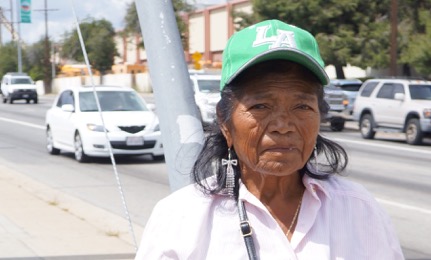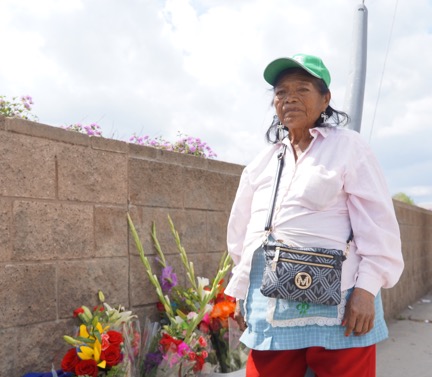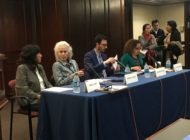A report shows that undocumented immigrants contribute billions to state and local economies. Still, these individuals are denied social and health entitlements. Furthermore, welfare reform seems unlikely under the current administration.
By ZAIDA DÍAZ
EL NUEVO SOL
Juana Cornijal walks up and down a median strip on Sherman Way and Laurel Canyon selling bouquets of flowers under the hot sun. The 70-year-old woman has worked as a street vendor for 27 years and says in Spanish that she will continue to until “God allows her.”
Cornijal is among those undocumented seniors in the United States who do not have access to government programs including Social Security, Medicare, subsidized housing and more.
Since none of the 11 million undocumented immigrants in the country are eligible for health insurance under the Affordable Care Act, some obtain health insurance through private employers or by buying health insurance from brokers.
Cornijal is one of the 3 million undocumented immigrants in California who does not qualify for health insurance. Instead, she visits a community health clinic for basic health services. There, she receives treatment for her diabetes and cirrhosis at little to no cost.
But in the case of an emergency or if she were to ever need surgery, Cornijal would be unable to afford a high hospital bill with the money she makes from selling flowers for $10 a bouquet.
Like other elderly undocumented immigrants, Cornijal is worried by the thought of an unsettling future. She says, “It’s hard to survive here, but it would be worse in Mexico.”
Although undocumented immigrants can turn to community health clinics for health care, the health care resources available to them are insufficient when compared to this large fraction of the undocumented population.
Although some believe that undocumented immigrants drain the U.S. economy, a 2016 report from the Institute on Taxation & Economic Policy (ITEP) actually found that undocumented immigrants contribute an estimated $11.74 billion to state and local tax coffers each year. Of the $11.74 billion, $3.1 billion is contributed by undocumented immigrants in California alone.
The study found that immigrants here illegally pay billions through a combination of sales and excise, personal income and property taxes.

Juana Cornijal, 70, street vendor. Photo by Zaida Diaz
Juana Mejía, 56, works as a housekeeper for four families and has lived in the U.S. for 30 years. Mejía has paid taxes every year by using an IRS-issued Individual Taxpayer Identification Number.
Mejía is not eligible to receive benefits that she helps fund. “It’s not fair that as I get older I won’t be able to retire like many other do when they reach their sixties,” Mejia says in Spanish.
Mejía has no children or family in the U.S. that can help support her economically as she grows older. In fact, she often sends money to relatives in her native country of Guatemala.
The ITEP report also estimated that under comprehensive immigration reform, undocumented immigrants’ state and local tax contributions could increase by $2.1 billion – increasing their tax rate from 8 to 8.6 percent. Under the Trump administration though, immigration and welfare reform seem improbable.
Tags: immigrants Juana Cornijal Juana Mejía taxes Zaida Díaz














